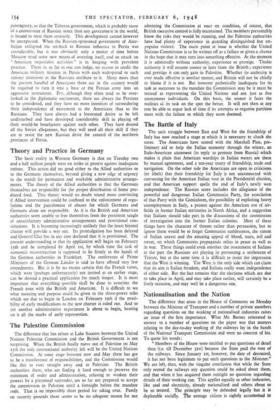Theory and Practice in Germany
The basic reality in Western Germany is that on Tuesday two and a half million people were on strike in protest against inadequate rations. This action did no good either to the Allied authorities or to the Germans themselves, beyond giving a new edge of urgency to the search for permanent and workable administrative arrange- ments. The theory of the Allied authorities is that the Germans themselves are responsible for the proper distribution of home pro- duced food. This theory would no doubt sound more convincing if Allied intervention could be confined to the enforcement of regu- lations and the punishment of abuses for which Germans and Germans alone are responsible. As it is the British and American authorities seem unable to free themselves from the persistent tangle of unsatisfactory administrative arrangements and provisional con- stitutions. It is becoming increasingly unlikely that the latest bizonal charter will provide a way out. Its promulgation has been delayed and General Clay has in any case declared that it is provisional. The present understanding is that its application will .begin on February 15th and be completed by April 1st, by which time the task of economic reconstruction is supposed to be firmly in the hands of the German authorities in Frankfurt. The conference of Prime Ministers of the German Lander is said to have offered very few amendments. But it is by no means certain that the French views, which were (perhaps unfortunately) not invited at an earlier stage, can be denied a practical application for much longer. It is most important that everything -possible shall be done to associate the French zone with the British and American. It is difficult to see what meaning and purpose could be given to the three-power talks which are due to begin in London on February 19th if the possi- bility of early modifications -to the new charter is ruled out. And so yet another administrative experiment is about to begin, bearing on it all the marks of early supersession.






























 Previous page
Previous page